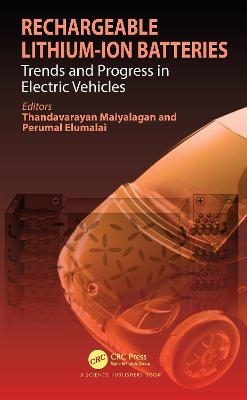
Rechargeable Lithium-Ion Batteries
CRC Press (Verlag)
978-1-138-48409-2 (ISBN)
Dr. Thandavarayan Maiyalagan received his PhD in Physical Chemistry from the Indian Institute of Technology, Madras, and completed post-doctoral programs at the Newcastle University (UK), Nanyang Technological University (Singapore) and at the University of Texas, Austin (USA). Presently he is an Associate Professor of Chemistry at SRM Institute of Science and Technology, India. His main research interests focus on design and development of electrode nanomaterials for energy conversion and storage applications, particularly fuel cells, supercapacitors and batteries. His research and collaborations have resulted in 140 papers in peer-reviewed publications (with 7500 citations and an H-index of 36) and edited a fuel cell book for John Wiley. He received Young Scientist Awards for the year 2017 from Academy of Sciences, Chennai. Dr. Perumal Elumalai received his PhD from Solid State and Structural Chemistry Unit, Indian Institute of Science Bangalore. He had his post-doctoral research at Kyushu University, Japan for more than six years. He was a recipient of a prestigious JSPS fellowship (Japan Society for the Promotion of Science fellowship). He has won special recognition award for Young Ceramist by Ceramic Society of Japan for his contribution to ceramics applications. He has travelled widely on professional engagements. Presently, he is a Professor at Department of Green Energy Technology, Madanjeet School of Green Energy Technologies, Pondicherry University, India. He has published more than 80 research papers in reputed international journals including book chapters, and holds six patents. Currently, his H-index is 22. His research work concentrates on batteries, supercapacitors, fuel cells and automobile emission sensors.
Preface. Fundamentals Principles of Lithium-Ion Batteries. Issues and Challenges of Rechargeable Lithium-Ion Batteries. Materials for rechargeable Li battery systems. Advanced lithium-Ion batteries for Electric Vehicles: Promises and Challenges of Nanostructured Electrode Materials. Advanced High Voltage Cathode Materials for Rechargeable Lithium-Ion Batteries. Nickel-based Cathode for Li-ion Batteries. Graphene-Based Composites as Electrode Materials for Lithium Ion Batteries. Polymer Electrolytes for Lithium-Ion Batteries. Processes and Technologies for The Recycling and Recovery of Spent Lithium-Ion Batteries. Batteries Charge Controller and Its Technological Challenges for Plug-In Electric and Hybrid Electric Vehicles.
| Erscheinungsdatum | 16.01.2021 |
|---|---|
| Zusatzinfo | 34 Tables, black and white; 86 Illustrations, black and white |
| Verlagsort | London |
| Sprache | englisch |
| Maße | 156 x 234 mm |
| Gewicht | 675 g |
| Themenwelt | Technik ► Elektrotechnik / Energietechnik |
| Technik ► Maschinenbau | |
| Technik ► Umwelttechnik / Biotechnologie | |
| ISBN-10 | 1-138-48409-1 / 1138484091 |
| ISBN-13 | 978-1-138-48409-2 / 9781138484092 |
| Zustand | Neuware |
| Haben Sie eine Frage zum Produkt? |
aus dem Bereich


